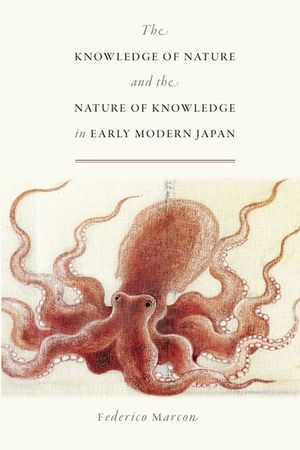The Knowledge of Nature and the Nature of Knowledge in Early Modern Japan
Published by The University of Chicago Press
“Opens a fascinating window into the history of Japan’s relationship to its natural environment. . . . A must-read for historians of early modern science.” —New Books in East Asian Studies
Between the early seventeenth and the mid-nineteenth century, the field of natural history in Japan separated itself from the discipline of medicine, produced knowledge that questioned the traditional religious and philosophical understandings of the world, developed into a system (called honzogaku) that rivaled Western science in complexity—and then seemingly disappeared. Or did it? In The Knowledge of Nature and the Nature of Knowledge in Early Modern Japan, Federico Marcon recounts how Japanese scholars developed a sophisticated discipline of natural history analogous to Europe’s but created independently, without direct influence, and argues convincingly that Japanese natural history succumbed to Western science not because of suppression and substitution, as scholars traditionally have contended, but by adaptation and transformation.
The first book-length English-language study devoted to the important field of honzogaku, The Knowledge of Nature and the Nature of Knowledge in Early Modern Japan will be an essential text for historians of Japanese and East Asian science, and a fascinating read for anyone interested in the development of science in the early modern era.
“Marcon introduces to a Western readership for the first time the early history of natural history in Japan . . . Who those naturalists were, how they fitted into society, and what they accomplished, is Marcon’s beautifully told story.” —Archives of Natural History
“A bold attempt to provincialize Eurocentric narratives of modernity’s relation to nature.” —Canadian Journal of History
“An essential resource.” —Journal of Japanese Studies
Between the early seventeenth and the mid-nineteenth century, the field of natural history in Japan separated itself from the discipline of medicine, produced knowledge that questioned the traditional religious and philosophical understandings of the world, developed into a system (called honzogaku) that rivaled Western science in complexity—and then seemingly disappeared. Or did it? In The Knowledge of Nature and the Nature of Knowledge in Early Modern Japan, Federico Marcon recounts how Japanese scholars developed a sophisticated discipline of natural history analogous to Europe’s but created independently, without direct influence, and argues convincingly that Japanese natural history succumbed to Western science not because of suppression and substitution, as scholars traditionally have contended, but by adaptation and transformation.
The first book-length English-language study devoted to the important field of honzogaku, The Knowledge of Nature and the Nature of Knowledge in Early Modern Japan will be an essential text for historians of Japanese and East Asian science, and a fascinating read for anyone interested in the development of science in the early modern era.
“Marcon introduces to a Western readership for the first time the early history of natural history in Japan . . . Who those naturalists were, how they fitted into society, and what they accomplished, is Marcon’s beautifully told story.” —Archives of Natural History
“A bold attempt to provincialize Eurocentric narratives of modernity’s relation to nature.” —Canadian Journal of History
“An essential resource.” —Journal of Japanese Studies
BUY NOW FROM
COMMUNITY REVIEWS

